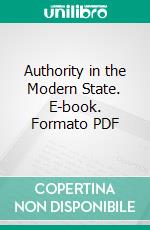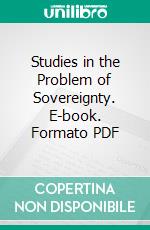Harold J Laski eBooks
eBooks di Harold J Laski di Formato Pdf
Authority in the Modern State. E-book. Formato PDF Harold J. Laski - Forgotten Books, 2017 -
His volume is in some sort the sequel to a book on the problem of sovereignty which I published in March, 1917. It covers rather broader ground, since its main object is to insist that the problem of sovereignty is only a special case of the problem of authority, and to indicate what I should regard as the main path of approach to its solution. Where, therefore, the previous studies were, in the main, nega tive and critical, this book is positive and constructive. In the main, the evidence upon which its conclusions are based is French. That is because an earlier study of de Maistre con vinced me that it is in France, above all, that the ideals I have tried to depict are set in the clearest and most suggestive light. I had originally intended to follow this volume by a third essay on the political theory of the Conciliar Movement. But it now seems to me more useful to attempt a definitely con structive analysis of politics in the perspective set by the first chapter of this present volume. Accordingly I have planned a full book on the theory of the state which I hope to have ready within a reasonable time. For so modest a volume this book, like its predecessors, has debts too immense to go without acknowledgement. Among the dead, I would like to emphasise how very much I have learned from Acton and Maitland; their writings have been to me a veritable store-house of inspiration. Among living men, I owe much to Professor Duguit of Bordeaux, to Dr. Figgis, and, in spite of, and perhaps because of, our differences, to Professor Dicey. My old tutor, Mr. Ernest Barker of New College, is the unconscious sponsor of this, as of my earlier book. Indeed, if it has merit of any kind, it is to the teaching of politics in the Modern History School at Oxford that I would ascribe it.
Karl Marx: An Essay. E-book. Formato PDF Harold Joseph Laski - Forgotten Books, 2017 -
Friedrich Engels was the son of a rich manufacturer in the Rhineland. His father owned a cotton mill near Manchester, to which, in 1842, Engels had been sent to study English business conditions. He was already an eager critic of social conditions, and how carefully he observed the life about him, his Condition of the Work ing Classes in England in 1844, which he published in 1845, bears Witness. A sympathizer with the Chartist Movement, and a contributor to Owen's New Moral il/vorld, he was exactly in the frame of mind to be recep tive to Marx's ideas. And his personal qualities admirably fitted him to be the complement of Marx. Thoroughly loyal, without an atom of personal ambition, generous, and self — effacing, practical and energetic, he brought to Marx all the necessary characteristics of a Pidas Aclzates. His unstinting literary assistance hardly less than his constant financial aid were the materials which determined Marx's future career. It is, indeed, almost impossible to disentangle the labours of the two; Clearly enough, it was to Engels that Marx owed both his knowledge of English blue-books as a source of economic theory, and his introduction to the work of the English socialist school. Without Engels, too, it would have been difficult for Marx to undertake the research to which the first volume of the Capital bears witness and the posthumous publication of the two latter volumes was the tribute that Engels paid to the memory of his master. That Marx would have been an important figure without Engels is clear enough; but the aid ren dered bythe latter made all the difference between the comparative calm of London and the restless wanderings of which hapless exiles like Bakunin were the miserable victims.
Studies in the Problem of Sovereignty. E-book. Formato PDF Harold J. Laski - Forgotten Books, 2017 -
I should like, too, to associate whatever there is of good in the thought of this book, with the name of my friend, Alec Rowan Herron, Scholar of New College and second-lieutenant in the King's Royal Ri?es, who fell at Givenchy in the first year of war. What we have lost in him only those of us who had the rare privilege of his intimate friendship can tell; but I may be permitted to say that it was the opinion of those with the right to judge that a very brilliant career lay before him. This book could never have been written were it not for the constant and splendid sympathy of my friend, Professor Frankfurter of the Harvard Law School. If I mention that, and the debt it of course owes to my wife, it is not in repayment, but in recognition. They, I know, will understand.


